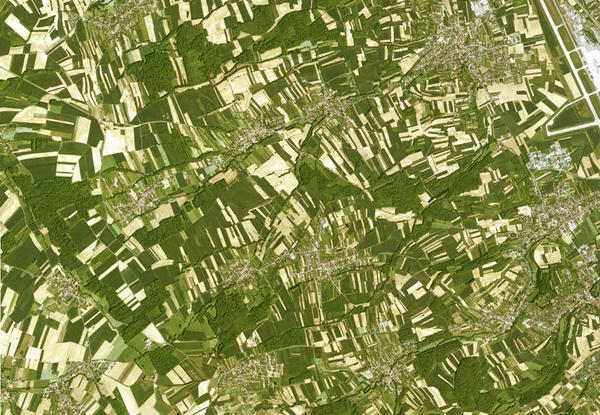Metabolism Food

Food in Basel - The Metabolism of Cities
Energy-Water-Food-Land-Waste
ETH Studio Basel has started a new urban and territorial research project looking at the metabolism of cities. Energy-Water-Food-Land-Waste represent some of the material flows into and out of our urban space. More than just the “infrastructure” of a city, the flow of matter has always had fundamental impact on the shape and the operation of our urban territories, linking topics such as trade and cultural exchange, with resources and sustainability, as well as with the relationship between the urban and the rural.
For the academic year 2011/12 we will start this research phase by looking at food as a means of understanding the larger inputs and outputs of the city, and as a force that allows us to analyze the territorial dimension of the urban condition. How does food shape our cities? How and where is food produced? How does food travel from its place of production, via processing centers into the shops and markets? What kind of infrastructure is employed? What kind of energy is used and what kind of waste is produced? How do we feed cities and regions? These are some of the questions that the research project will be engaged with. Beyond the question of food, it will also allow us to understand how cities are essentially tied to a territorial dimension and to a network of material flows, thereby inherently undermining the classical notion of a rural / urban divide. Other topics of metabolism, such as energy and waste will be studied in subsequent years.
Food in MetroBasel
The tri-national territory of Basel and its regional context will be the focus for the topic of food. Although it is an area we have studied in the past, we will be able to understand it in a novel way through the perspective of metabolism and food, and its associated questions. Thematically the semester will follow the “food chain” by looking at topics such as water, agriculture, the production of food, its distribution, its trading, preparation and eating, and ultimately ending with the subject of waste. Through our local expertise and existing networks we plan to use the project to eventually have an impact on the ongoing local and regional discussion of urban and territorial planning and influence or trigger actual proposals. The students will be able to build upon our previous research, such as the Metrobasel Comic and Switzerland: An Urban Potrait, and immerse themselves into a topic that attempts to ask fundamental questions about everyday life and its spatial dimension in this region.
Semester Organization
For the first time, instead of a one-semester research project, we will structure our program as a combined research and design studio lasting two semesters. This will give us a unique opportunity to connect an in-depth investigation into a specific research topic with the development of an urban or architectural design proposal. In view of this approach and the potentials that it involves, we therefore seek students who are very committed to engage in this long-term project with us. Accepting only 14 students, working in groups of two, it is mandatory to enroll for two consecutive semesters (fall 2011 and spring 2012).
The first semester will focus on the careful and precise description, documentation and analysis of existing processes while in the second semester the students will develop a projective dimension and design proposal out of their analysis. The project starts on Tuesday 20th September 2011, at ETH Studio Basel, Spitalstrasse 8, 4056 Basel.
In October 2011, we will travel to Piedmont, Italy for a one-week fieldwork and workshop with the University of Gastronomic Sciences (UNISG) in Bra. In order to get a global perspective on the topic of food this is followed by a one-week field trip in March 2012 to Havanna (Both study trips are compulsory.)
The research project will use a number of tools that have been developed by ETH Studio Basel in the past, expanding these methodologies in the context of the topic of metabolism.
The final presentation of the student’s works will be in the form of a book and a slide presentation. The estimated fees for participating in the project will be 900CHF for HS 2011 and 1400 CHF for FS 2012. Students who are receiving stipends and grants, or who have been exempted from school fees can seek financial assistance by the ETH.
(Application forms are available through Mrs. Giordano, HIL E 73.3)
PEOPLE: PROF. JACQUES HERZOG, PROF. PIERRE DE MEURON, CHARLOTTE VON MOOS, LISA EULER, SHADI RAHBARAN, MANUEL HERZ, PROJECTS: THE CITY + ENERGY

